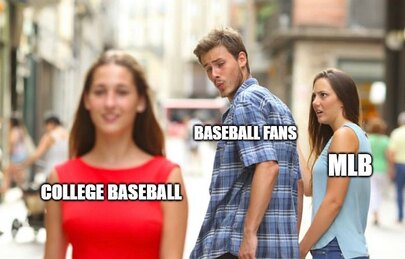 The meme that spurred the epiphany The meme that spurred the epiphany Sam Burnham, Curator The Major League Baseball lockout is delaying the opening of the regular season and leaving baseball fans holding their hats and their mitts while two opposing sets of millionaires (and at least a few assorted billionaires bicker about what is "fair." This is far from the first time a labor dispute has robbed fans of our national pastime. Strikes have plagued baseball for decades and the average fan is who always seems to pay the price. It was an internet meme that led me to an epiphany. I'm a bit disappointed that I didn't arrive at this conclusion on my own. I mean over-centralization is the ubiquitous problem that is destroying everything good and pure and beautiful and functional in our world today. It was as plain as the nose on my face. Baseball is over-centralized. The meme suggests that college baseball is attracting the attention of fans who are hungry for action on the diamond and are willing to look anywhere to find it. This brings me to a point. 100 years ago, MLB was the pinnacle of baseball. Fans in big cities which is to say the Northeast and Midwest, flocked to stadiums that not only housed the home team but also offered fans with an expanse of greenspace that was atypical in the city. The sport gave city dwellers a connection to some semblance of nature, a connection to the land. It was the closest many people would ever get to the countryside. Elsewhere in the country, baseball was scattered throughout small clubs, industrial leagues. recreational clubs, etc. Baseball was everywhere despite the fact that the only news most fans had of MLB was seeing box scores in the newspaper. Local teams meant that fans had baseball available where they were. Televised games were as nonexistent as television itself. The very first radio broadcast of a game was in 1921, some 17 seasons after The Boston Red Sox beat the Pittsburgh Pirates in the first ever World Series. Baseball wasn't the national pastime because of the glitz and glamor of the Big Leagues. It was the national pastime because it was everywhere. MLB was just one piece of the pie. Sure, we have the Minor Leagues today. But they are coming under increased control of MLB. As the Big Leagues cut ties to smaller clubs and take a more hands-on approach, the Minors suffer. Recently the Chattanooga Lookouts, who have been playing ball in the Scenic City since 1885, were informed by MLB that they would have to relocate if the city fathers did not agree to replace their 22-year-old stadium. Chattanooga stands to lose a 137-year-old tradition because people who do not live there have determined that AT&T Field "does not offer the proper amenities for players." So, the same people who locked out the players denying Chattanoogans the chance to see the Braves or the Lookouts' affiliate Cincinatti Reds are saying Minor League Baseball may leave the city. Take a look at MLB baseball. Thirty teams filling out 40-man rosters means that 1200 players take the field. That's an exclusive bunch, considering the players now come from all of the Earth. There is a very fine line between "Player 1200" and "Player 1201." Some incredible ballplayers will never see the field in the Major Leagues. Many of them will wow crowds in places like Chattanooga, Tennessee, Greeneville, South Carolina, or Rome, Georgia. There is a lot of good baseball out there that is not happening in the big leagues. And there can be even more. That "Army of Steam Rollers" that Terrance Mann (James Earl Jones) spoke of in his soliloquy at the denouement of Field of Dreams is sitting in the garages all over America, just waiting for someone to open the doors. Yes, college baseball is part of that army. So are the Minor Leagues. But there are also divisions of that army that, at present, only lie in the human imagination. The players are available. That means the coaches and managers are as well. Baseball could have a very bright future if we are willing to support the return of its past. Decntralized baseball. Local baseball. Regional baseball. Yes, MLB offers us the best players at the peak of their performance. It offers the fans amenities that can't be found elsewhere. But is that what the game is about? For a true fan, a real purist, the game is portable. There's the strategy, the fundamentals, the smell of fresh cut grass, a hot dog and a cold beer, keeping score in the stands. There's the leisure of enjoying a game on a beautiful spring afternoon. There's the decadence of skipping work for a "businessman's special." There's watching the sunset at a twilight doubleheader. These aren't patented by MLB. We could do this elsewhere. I thought I had come to hate baseball after the strike in '94-'95. I finally came back a few years ago and learned that I really enjoy the game. But I enjoy it for the traditional nature of the game. I enjoy everything that is beautiful about the game. I hate the greed and the selfishness of the owners and the union. I don't ever remember reading about a strike or lockout in the textile leagues. Minor leaguers are too busy trying to get to the majors to get involved in such nonsense. We have better options available. And then there are the divisions of steamrollers holed up in the imaginations of fans and purists. Will imagination and money ever meet up? Will MLB remain the only show in town? Only time will tell.
0 Comments
Leave a Reply. |
Sam B.Historian, self-proclaimed gentleman, agrarian-at-heart, & curator extraordinaire Social MediaCategories
All
Archives
November 2022
|




 RSS Feed
RSS Feed
